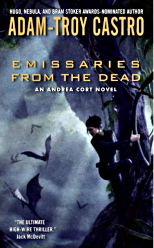Review: Emissaries from the Dead by Adam-Troy Castro
 While in college in the late '80s I freelanced for Amazing Heroes, a comics magazine that paid slightly more than the postage required to mail the checks. I was part of a reviewing stable that included Adam-Troy Castro, a writer with a misplaced hyphen who recently wrote Emissaries from the Dead, his first science fiction novel set in a world of his own making.
While in college in the late '80s I freelanced for Amazing Heroes, a comics magazine that paid slightly more than the postage required to mail the checks. I was part of a reviewing stable that included Adam-Troy Castro, a writer with a misplaced hyphen who recently wrote Emissaries from the Dead, his first science fiction novel set in a world of his own making.
Emissaries, which is subtitled "An Andrea Cort Novel," carries forward a protagonist and setting from his short stories. The world's wonderfully bizarre, an artificial planet built on the inside of a miles-long cylinder by millenia-old sentient software called the AIsource. Each advanced civilization explores space first with its software, and this code has outlived its coders, joining together with programs from other worlds to form one megabloated Windows release that controls the universe.
The software has engineered sloth-like, spider-armed primates who hang from the vines and roots growing on the outer edge of the world, surviving only as long as they can hold on. These creatures are called Brachiators, from the verb brachiate, and they're the most fascinating thing about the novel.
The battlefield was a patch of Uppergrowth indistinguishable from any other, marked only by the thirty nearly immobile figures wrapped in what their species must have considered to be frenetic combat. There were two groups, whose paths prior to this moment in their respective histories were easy to track by the vines they'd shredded in their wake. They hadn't collided head-on, but rather at an angle, joining in battle as soon as both tribes realized that they'd now be competing for the same patch of their world's ceiling.
The fresh, juicy manna pears hanging in bunches from every vine in sight revealed the conflict as ridiculous, as even Brachiators forced into a course change could have found more food than they could possibly eat within an hour's travel, but that didn't matter to them; their armies had met, and their war had to be fought. ...
The Brachiator battlefield looked like an orgy where everybody had fallen asleep in mid-hump.
Unfortunately, the Brachiators aren't the focus. The novel's about two murders that take place in the small colony of human researchers sent to the planet. Cort's an unloved diplomat sent to solve the crimes without implicating the AIsource, and the bulk of the 386-page novel consists of her talking to potential suspects and interacting with the AIsource, who pose a constant threat to go all deus ex machina and kill the suspense. Castro's story is all talk, ending with Cort's uninterrupted six-page Scooby Doo monologue on how she solved the crimes.
Despite the weaknesses in plotting, Castro's setting carries the book and makes the prospect of another "Andrea Cort novel" intriguing. She just needs a mystery that hangs on a species as compelling as the Brachiators.
Comments
One of these days I'd like to read a mystery novel that doesn't rely on the age-old mystery technique of a long monologue towards the end that suddenly puts all of the previous clues in the book together in one blinding revelation. I'm sure it's out there, I just haven't read it yet. Any recommendations?
Add a Comment
All comments are moderated before publication. These HTML tags are permitted: <p>, <b>, <i>, <a>, and <blockquote>. This site is protected by reCAPTCHA (for which the Google Privacy Policy and Terms of Service apply).

